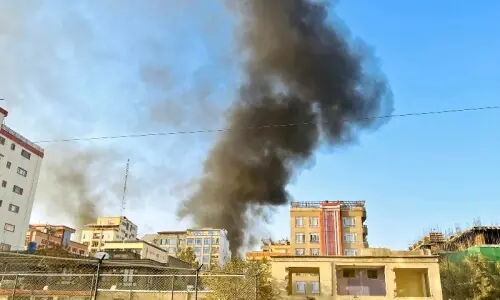Pakistan and Afghanistan’s Taliban authorities have agreed to a temporary ceasefire after a fresh round of deadly cross-border clashes threatened to escalate into a wider regional conflict. The agreement, brokered at the Taliban’s request and announced by Pakistan’s Foreign Office, took effect at 6:00 p.m. local time Wednesday and is set to last for 48 hours. Both sides have pledged to make sincere efforts to resolve the crisis through constructive dialogue during the ceasefire period. However, the Taliban’s statement on social media portrayed a different version of events, claiming the truce began at 5:30 p.m. Kabul time “at the request and insistence of the Pakistani side” and would remain in force “unless there is a violation.” The differing narratives — Pakistan specifying a 48-hour duration and dialogue, and the Taliban describing an open-ended ceasefire without mentioning talks — underline the fragile trust between the two neighbours.
Though neither side officially confirmed external mediation, diplomatic sources suggested that Qatar played a facilitating role. Pakistan’s Deputy Prime Minister and Foreign Minister Ishaq Dar received a message from Qatar’s Minister of State for Foreign Affairs, Dr Abdulaziz Al-Khulaifi, shortly after the truce was announced. Qatar commended Pakistan’s “constructive engagement” in promoting regional peace, and Islamabad expressed gratitude for Qatar’s “consistent support and positive role.” This marks the second ceasefire since hostilities erupted on October 11, though the first truce was not publicly announced. Diplomatic insiders said Saudi Arabia and Qatar intervened at that time to ease tensions.
The ceasefire underscores a sharp deterioration in Pakistan–Taliban relations. Once anchored in historical links and mutual dependence, ties have frayed since the Taliban’s takeover of Kabul in 2021. Islamabad had hoped for close counterterrorism cooperation against Tehreek-i-Taliban Pakistan (TTP). Instead, the Taliban’s reluctance to curb the TTP has become the central irritant. Pakistani officials say the latest clashes reflect more than a border management issue — they view them as Kabul’s unwillingness to act against cross-border militancy. The Taliban, for its part, perceives Pakistani strikes inside Afghanistan as violations of sovereignty, reinforcing its domestic narrative of resisting external interference.
The latest hostilities began late Tuesday and intensified early Wednesday, when Taliban fighters launched coordinated attacks on Pakistani border positions in Balochistan’s Chaman sector. According to Pakistani officials, the fighting erupted around 2:00 a.m. after Taliban forces opened fire with mortars and heavy weapons at a post in Sui Karez, near the Kozak Pass. Pakistani troops retaliated immediately, sparking intense exchanges that lasted several hours and spread to multiple border points. Taliban fire also hit nearby villages, injuring several civilians, including women and children. Local hospitals were placed on emergency footing, schools were closed, and residents fled to safer areas. In response, Pakistan launched retaliatory strikes targeting Taliban camps in Kandahar and Spin Boldak, from where the attacks were believed to have been mounted. Officials reported that at least 20 Taliban fighters were killed and several installations destroyed. Taliban sources in Kandahar confirmed eight deaths in Spin Boldak and dozens of injuries. By morning, fighting also spread to the Kurram border region, where Pakistani forces claimed to have killed 25–30 Taliban and TTP militants and destroyed multiple posts and tanks.
Shortly before the ceasefire was announced, two explosions rocked Kabul’s Taimani neighbourhood around 4:00 p.m. local time. Taliban officials attributed the blasts to an oil tanker fire, but residents described two separate explosions roughly 20 minutes apart. Video footage showed a multi-story building engulfed in flames. Kabul Surgical Centre reported 40 casualties, including five fatalities. State-run Pakistani media later reported that “precision strikes” had targeted leadership elements of the TTP inside Afghanistan, though Islamabad did not officially confirm responsibility.
While the ceasefire temporarily halts the violence, Pakistani officials and analysts expressed skepticism about its durability. Defence Minister Khawaja Asif openly questioned whether the truce would hold, accusing the Afghan Taliban of acting as a “proxy” for India. “I have my doubts that the ceasefire will hold, because the [Afghan] Taliban are being sponsored by Delhi,” he said. “Right now, Kabul is fighting a proxy war for Delhi.” Asif reaffirmed Pakistan’s readiness to respond if the Taliban violated the ceasefire. “We have the capability and we will attack them, God willing, if they escalate or widen the radius of this war,” he said. “We do not want to fight, but if we are attacked, we have the right to respond in kind.” He also indicated that friendly nations, including Saudi Arabia, may intervene if the situation deteriorates further, though he described such involvement as “speculative” at this stage.
As both sides enter this temporary truce, the focus will be on disengagement measures and possible follow-up talks. Pakistani diplomats say their priority is securing assurances on dismantling cross-border terrorist sanctuaries — the core issue driving the current crisis. Observers warn that without structured dialogue, third-party monitoring, or trust-building mechanisms, the ceasefire is likely to be short-lived. The situation remains volatile, with both sides on high alert and regional actors quietly working to prevent a broader conflagration. The unfolding standoff highlights a rapidly changing dynamic: Pakistan’s traditional leverage over Kabul is diminishing, and the Taliban is asserting greater autonomy — even at the cost of escalating tensions with its most important neighbour.


